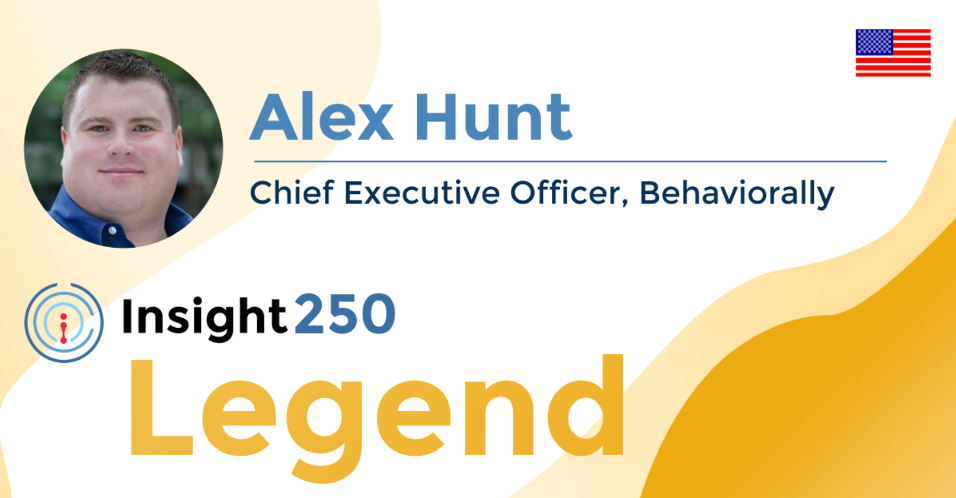The growing impact of AI on Data & Insights
Alex Hunt discusses the growing and evolving role of artificial intelligence (AI) in the insights industry, including its impact on approach, methodology, and people.


The Insight250 spotlights and celebrates 250 of the world’s premier leaders and innovators in market research, consumer insights, and data-driven marketing. The awards have created renewed excitement across the industry whilst strengthening the connectivity of the market research community. Nominations for the 2024 Insight250 are now open at Insight250.com.
With so many exceptional professionals named to the Insight250, it seems fitting to tap into their expertise and unique perspectives across various topics. This regular series does just that: inquiring about the expert perspectives of many of these individuals in a series of short topical features.
This edition features Alex Hunt, the chief executive officer for Behaviorally. Alex and I discuss the growing and evolving role of artificial intelligence (AI) in the insights industry, including its impact on approach, methodology, and people. Alex provides his unique insight as a leader of an organisation that is immersed in ever-changing technology.
Crispin: Alex, you’ve long been an advocate for AI's impact on the insights sector. How do you think AI has the potential to help us?
Simply put, AI is the science of building machines that are trained to think and thus predict what humans will do. When applied for workflow automation, this capability will assist humans and improve productivity across all industries, and data and insights are no exception. But the impact of AI will be much more profound for any industry that is in the prediction business: from self-driving cars, where life and death may rely upon a perfect machine prediction of human response to traffic patterns through data and insights where billions are spent, and even more consequential policy or marketing decisions are made based on predictions of voter or consumer responses to different candidates, brands, communications, or new product efforts. AI will deliver not only more accurate predictions of human behaviour to enable better decisions, but also provide these predictions at previously unimagined scale, speed, and low cost.”
Alex Hunt
Crispin: If you were to place the impact of AI on the data and insights industry into a historical context, what comparisons might you draw?
In my data and insights career, I’ve witnessed massive opportunities arise from two waves of disruption: the transition of how data is collected from analogue methods such as pen and paper and telephone to digital, as well as the alignment of the data we collect with what behavioural sciences have taught us about human decision-making. It took a decade for each of these waves of disruption to restructure the industry's economic and intellectual model, and AI will be no different in the time it takes to reach maturity. However, I firmly believe that AI has the potential to be equally, if not much more, transformative than online data collection or behavioural science over the next decade.”
Alex Hunt
Crispin: So, how should insights professionals prepare for the impact of AI on their roles?
To begin, Crispin, I’d re-phrase the question. It’s not so much about bracing for impact as it is about shaping and exploiting the opportunity AI presents. On a personal level, and as data and insight professionals, we each need to get familiar with and comfortable using AI tools. For example, in 2023, we challenged all Behaviorally team members to try various AI apps and feedback to the firm on how they might support our day-to-day. The results were fantastic, and we almost immediately reduced the time to complete many tasks, from drafting marketing collateral to summarising themes in qualitative consumer feedback. In the same way that basic Excel and PowerPoint knowledge is mandatory for anyone in a professional role, in the future, so too will be a working knowledge of how to use various AI tools that assist with your day-to-day. As is always the case, I recommend that any individual or organisation get started somewhere and begin getting familiar with transformative technology.”
Alex Hunt
Crispin: As a business leader, you must also have a broader vision of how Behaviorally will utilise AI?
Absolutely. The process efficiency that AI brings to Behaviorally team members and customers is already hugely significant. We’ve been on a journey to productise over the past 5-years, so we’re set up well for success. But the commercial advantage of AI-enabled workflow automation will ultimately be felt across the industry, aside from those few remaining legacy agencies still operating on a bespoke model (and assuming they survive much longer), and any commercial advantage might thus be short-lived.
“The more lasting and profound impact of AI-enablement on the value Behaviorally can bring to customers will be evident in our core business: predicting human behavior, specifically the response to packaging design at the moment of the purchase transaction. We’ve already connected vision recognition AI with our 80,000-strong behavioral database of pack designs and sales data in a way that allows us to predict the impact of a packaging design change more precisely and instantly via our PackPower Score. We now know that the most effective pack design changes can, in isolation, lift sales to five percent, while poor design execution might have a negative impact of the same order of magnitude. We see continual refinement to the accuracy of our PackPower Score, already an industry default for measuring the effectiveness of pack design, as fundamental to our vision to become a fully AI-enabled company. AI will enable this ever more accurate PackPower Score to predict the sales impact of design change at exponentially greater scale and speed for lower cost.”
Alex Hunt
Crispin: It appears we can expect a future of volume one number predictions of marketing effectiveness devoid of any human overlay or diagnostic.
Absolutely not: the classic fear of any legacy researcher! Look, it’s easy to diminish the impact of single-number scores. The complexity and scale of digital commerce, for example, the e-commerce shelf, coupled with time-starved C-suite executives at all large brands, demand a simplified (and accurate!) prediction of consumer behaviour in response to a great many planned marketing initiatives. Love or hate them, one-number scores provide precisely this. But that said, in any market where one part becomes much more widely available at a lower cost, we witness not only an increase in consumption of that component but also a surge in demand and the value placed upon compliments.
“For example, if the price of a beverage were to collapse to the point of being close to free, then people would not only consume more of that beverage but also seek a greater number of mixers to mix with, glasses or bottles to drink from, and even occasions or venues in which to drink. In data and insights, AI will enable a future of much more accurate and widely available low-cost predictions of human behaviour. Still, a second-order consequence will be increased demand for the advice and judgment of qualified experts on what to do next. I hypothesise that qualitative diagnostics will enjoy a boom, and we have witnessed this at Behaviorally, where we have seized the moment to complement all qualitative work with the PackPower score and invested heavily in our GLADYS qualitative platform. There will always be a place for human judgment as an overlay in a world of better AI-enabled predictions; in fact, the demand for and value of this will grow.”
Alex Hunt
Crispin: Who do you see as the winners and losers of this coming wave of AI disruption?
Those marketers and brands that want significantly better, faster, and cheaper predictions of whether their marketing efforts, including packaging, will drive in-market results will be winners. So, too, will those brands that want to supplement, understand, and explain a behavior prediction with the judgment and diagnostic provided by specialist insights consultants or target consumers. The providers that win will be those who are not only brave enough to lean into disruption but also sufficiently disciplined to exploit it: if you haven’t productized behavior science and built an industry-leading and unique behavioral dataset – a prerequisite for AI enablement –then you’re a long way behind. The losers will be those who continue redesigning research projects by project or providers who perhaps lazily have remained wedded to legacy data collection methodologies or overindulge in circular academic debates about what to measure. Those who are ahead have digitized data, operationalized behavioral science, and now sit atop a unique dataset, the true value of which AI is beginning to unlock.”
Alex Hunt
Hot topic: Generative AI
We’ve heard much about generative AI lately, but the word hasn’t come up yet. What is your team working on in this space?
Behaviorally is using generative AI tools today. For example, I referenced above the taking of inputs for marketing collateral or qualitative consumer feedback and leveraging AI to accelerate the production of outputs. But like the application of AI for more accurate marketing predictions, the differentiated impact of generative AI will be more sustainably differentiating in Behaviorally’s core packaging domain. If, as outlined, we’re able to and continue to improve the precision with which we can predict whether a pack design change will be effective, and as early as next quarter, are enhancing the AI-enabled diagnostics with which we explain this prediction to a level close to that collected directly by surveying consumers, the leap to using AI to generate effective pack design alternatives built on learning contained within our proprietary behavioural database is not a hard one to make. As you watch this space, imagine the ramifications of generative AI used in this capacity, not just in the packaging domain or specifically data and insights, but across the entire marketing services ecosystem and value chain.”
Alex Hunt
Top tip
What's your top tip for being an innovator and leader in our profession?
Too often, data and insights professionals have prided themselves on having the correct answer. Yet, to innovate, you must accept that the methods of the past, even if relationships or business have been built on being right, might have been wrong.
“Leadership has many complex elements, but the most important is ethics. Sometimes, in any career, pressure mounts to do the wrong thing. But remember, your integrity will be with you well after any crisis or challenge has subsided.”
Alex Hunt
Crispin: Thanks, Alex. Always a pleasure to hear from you and lots for all of us to reflect upon
 Alex Hunt applies behavioral science in practical ways to predict human behavior to support brands and advertisers. His career has spanned over 15 years in the insights industry. Currently, he serves as CEO of Behaviorally (formerly PRS), which applies behavioral science to improve shoppers' and consumers' experiences.
Alex Hunt applies behavioral science in practical ways to predict human behavior to support brands and advertisers. His career has spanned over 15 years in the insights industry. Currently, he serves as CEO of Behaviorally (formerly PRS), which applies behavioral science to improve shoppers' and consumers' experiences.
Crispin Beale
Chairman at QuMind, CEO at Insight250, Senior Strategic Advisor at mTab, CEO at IDXCrispin Beale is a marketing, data and customer experience expert. Crispin spent over a decade on the Executive Management Board of Chime Communications as Group CEO of leading brands such as Opinion Leader, Brand Democracy, Facts International and Watermelon. Prior to this Crispin held senior marketing and insight roles at BT, Royal Mail Group and Dixons. Crispin originally qualified as a chartered accountant and moved into management consultancy with Coopers & Lybrand (PwC). Crispin has been a Board Director (and Chairman) of the MRS for nearly 20 years and UK ESOMAR Representative for c15 years. As well as being CEO of Insight250, Crispin is currently Worldwide CEO of Digital Communications Solution Agency, IDX. Crispin is also the Senior Strategic Advisor at mTab and the Chairman of QuMind and spent 4 years as Group President of Behaviorally where he was responsibile for the client & commercial teams globally. Crispin is a passionate advocate for blending human intelligence and technology to deliver innovation and leadership across organisations.


